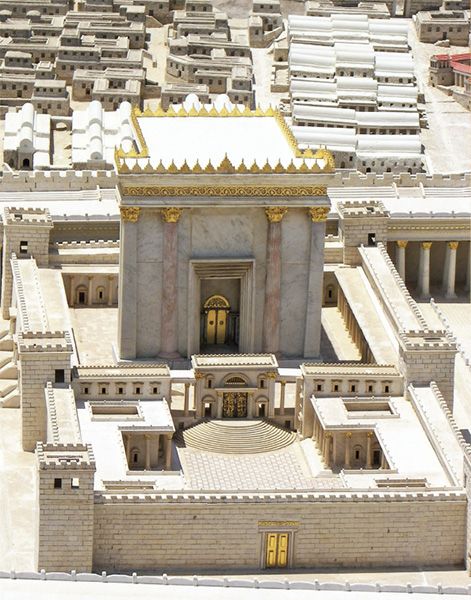I Peter 2:1 – So put away all malice and all deceit and hypocrisy and envy and all slander.
In chapter 1, Peter spoke about the marvelous salvation that Jesus made possible for the Christians in Asia Minor, and for us. Now that we have been 'born again' we must live a life that corresponds to this new birth.
Part of living a redeemed life includes casting off or laying aside sin, as you would a soiled or rotten garment. The sins Peter admonishes us to abandon include the following:
 Deceit or Guile: To disguise, conceal, deceive or delude. Cunning, treachery. This not only applies to our actions, but to our speech
Deceit or Guile: To disguise, conceal, deceive or delude. Cunning, treachery. This not only applies to our actions, but to our speech
and includes things like flattery, lying, distorting the truth, etc.
- Malice: Any wicked or mischievous intention of the mind; the intent/desire to injure or harm another person, rancor, maliciousness, ill will, etc.
- Hypocrisy: Pretending to be what you are not; a counterfeit, assuming a false appearance of religion, cloaking a wicked purpose under the appearance of piety.
- Envy: Discontent or malice because of the good fortune of another, with some degree of desire to possess equal advantages; jealousy.
- Slander or evil speaking: A false report maliciously uttered, which tends to injure the reputation of another; defamatory reports; to defame, dishonor or disgrace; backbiting.
Do you notice anything these sins have in common? They all relate to the way we interact with others. They also tend to appear together. In other words, slander/evil speaking is a sign that we are entertaining thoughts of malice, hypocrisy, envy or guile.
In fact, it is more than a sign – it is proof! Jesus revealed that out of the abundance of our hearts, our mouths speak (Luke 6:45). So if you want to know if envy or hypocrisy, etc are dwelling in you, check your mouth!
When we are born again, we start off as spiritual babies. We must grow in grace and mature in our walk with God. And even the most mature among us has not been perfected; any of us can stumble and commit one of these sins.
Therefore, we should not lightly cast off this warning by the apostle Peter to examine ourselves and purge these evils from our lives.
I Peter 2:2-3 – Like newborn infants, long for the pure spiritual milk, that by it you may grow up into salvation – if indeed you have tasted that the Lord is good.
All of us are aware that infants can only be fed with milk/formula. Their digestion has not matured to the point where they can eat solid food. However, if they continuously receive liquid nutrition, they will quickly grow and develop to the point where they can digest solids.
If you have children of your own, you know that infants have a constant and fervent desire to be fed. They don't care if it is 3:00 in the morning; if they are hungry they will cry/fuss until they get food!
Although there will be ups and downs along the way, we fully expect our children to grow up. As they grow and mature, we give them additional opportunities and privileges.
 The same principles apply to our spiritual lives. When we are born again as babies in Christ, we must provide ourselves a steady, regular supply of the word of God, which is the spiritual milk that Peter refers to in this verse. Our desire for the word of God should be just as fervent as the hunger of an infant.
The same principles apply to our spiritual lives. When we are born again as babies in Christ, we must provide ourselves a steady, regular supply of the word of God, which is the spiritual milk that Peter refers to in this verse. Our desire for the word of God should be just as fervent as the hunger of an infant.
By taking spiritual nourishment from the word of God, we will grow in the grace and knowledge of our Lord and Savior, Jesus Christ.
As we spiritually grow and mature, our Heavenly Father will present us with more and more opportunities and privileges within his kingdom!
Speaking of food, the apostle tells us that, as Christians, we have tasted that the Lord is good. In other words, we haven't just heard about the goodness of God, we have experienced it.
There is a big difference between knowing about something and experiencing it. Take, for example, driving a car. You can watch videos on how to operate the vehicle. You can study the driving laws and pass the written test. But none of that is the same as actually getting behind the wheel and pulling out into traffic.
In the same way, you can hear other people tell you about the goodness of God. You can read books written by people who have been saved and delivered from sin. But until that actually happens to you, you haven't 'tasted' the Lord yet!
Do you remember when you first heard the gospel message? Do you remember the feeling you experienced when he washed your sin away, and sealed you with the Holy Spirit?
And since then, as you have grown in your faith, haven't you discovered deeper levels of his joy and peace? As you get to know him more and more, doesn't your love for him deepen and grow?
Consider this: As wonderful as our relationship with God is, it is only a mere taste of what awaits us in eternity when we finally see him face to face!
I Peter 2:4 – As you come to him, a living stone rejected by men but in the sight of God chosen and precious,
It is common for the New Testament writers to described Jesus as a stone or a corner stone. This is an Old Testament reference to the Messiah:
Isaiah 28:16 – thus says the Lord God, "Behold, I am the one who has laid as a foundation in Zion, a stone, a tested stone, a precious cornerstone, of a sure foundation."
Psalms 118:22 – The stone that the builders rejected has become the cornerstone.
There are actually two ideas conceptualized in a cornerstone. The first is a foundation stone, upon which a structure rested. We find this referenced in places such as Isaiah 28:16 (see above), Job 38:6 or Jeremiah 51:26. Jesus is described as the cornerstone or foundation that the church is built upon.
But a cornerstone can also refer to the topmost or capstone on a building, which links the last tiers together. We find this referenced in places such as Psalms 118:22 (see above) or Zechariah 4:7. This is fitting because Jesus is not only the foundation, but also the one who binds the church together.
In both cases, the cornerstone is figurative of the Messiah (1 Corinthians 3:11, Ephesians 2:20, Matthew 21:42, etc), who is the first and the last. He has invincible strength and everlasting duration. He is our protection and our security. He is the sure foundation of our lives. Those who build upon him will stand in the storms of life (Matthew 7:24-27).
Notice that Peter refers to Jesus as a living stone. Under the new covenant, the church is no longer a building made of inanimate stones. It is a living temple, made of redeemed people, in which God now resides. Jesus himself lives eternally and he imparts life to all who build their lives upon him.
But there are men who have rejected him. Although many Gentiles have refused to acknowledge him, this is a direct reference to the Jews. They were looking for a Messiah of this world, who would uphold their traditions and customs, take authority over the Romans and set up an earthly kingdom. Their faith was shaken when Jesus did not do as they expected. At first they rejected him out of ignorance and blindness, but later out of malice and wickedness.
This presents a startling contrast with God's point of view. In his sight, Jesus is chosen and precious. He is the savior of the world; the perfect foundation on which the church rests. Since God can never be wrong, we can rest assured that the sacrifice of Jesus was sufficient to atone for all our sin, no matter how great.
I Peter 2:5 – you yourselves like living stones are being built up as a spiritual house, to be a holy priesthood, to offer spiritual sacrifices acceptable to God through Jesus Christ.
The first Jewish temple was built by King Solomon, and it was destroyed by Nebuchadnezzar when he invaded Jerusalem in 586 BC. By all accounts, it was a magnificent edifice.
A new temple was built by the returning Jewish exiles back in the days of Ezra and Nehemiah. This temple was much smaller and far less magnificent than Solomon's temple, but it was a temple nonetheless. It had been in existence for about 500 years by the time Herod became king in Judea.
In order to gain favor with the Jews, Herod offered to rebuild the temple and the Jews accepted his offer. It should be noted that the temple was torn down and rebuilt in sections. So in the end, it was an entirely new and glorious building but it was still considered the second temple. The project took 46 years to complete.
It might be difficult for us to imagine the feelings that the Jews had for their temple; to them it was by far the most important place on earth. It was the place where God was worshipped. It was the place where God dwelt (on the mercy seat between the cherubim of the Ark). Acceptable sacrifices were offered there. The priesthood ministered there. It was the meeting place between God and man.
Peter now makes an astonishing revelation to his readers - God has instituted a new, fully complete, fully functioning temple, which is even more glorious than the one they are familiar with!
This new temple is built upon Jesus Christ, a foundation of living stone. All individual believers are living stones, and together we are the united church of the Living God.
So God now dwells in temples of flesh – the hearts of believers everywhere. Therefore, Christians are the new priesthood, daily engaged in his service, led by our high priest Jesus Christ. Acceptable sacrifices and offerings are made in this new temple in the form of obedience, prayer and holy living by all believers. Worship occurs in the new temple; true believers worship him in spirit and in truth. Since God now dwells within us, we are in constant fellowship with him.
In short, all of the things that made the physical temple a true temple had been replicated in a new and living way – in the lives of Christians.
This would have given comfort to the Jewish Christians who lost such a big part of their heritage when they came to Christ. This knowledge would have been an even bigger comfort in about five years, when Herod's temple was destroyed.
It would also have been a consolation to the Gentile believers. They were excluded from worship in the physical temple at Jerusalem, but now they were admitted to the new and living temple of God. In fact, they too had become priests unto God which would never have been allowed under the Law.
What a blessing we have in Jesus! No longer are we limited by the law and its regulations. Now, all people can have God dwelling in them, at all times. Now, all believers can worship and fellowship with God in any place, at any time!
I Peter 2:6 – For it stands in Scripture: "Behold, I am laying in Zion a stone, a cornerstone, chosen and precious, and whoever believes in him will not be put to shame."
- Jesus is the cornerstone, the foundation stone, or the fundamental truth of Christianity; outside of him Christianity would not exist. He alone is the head and King of his church; he alone rules it in wisdom and righteousness.
- This foundation is laid in Zion. Zion is the name given to the main hills on which the city of Jerusalem was built. The term is sometimes used to refer to the city of Jerusalem itself. Under the law, Jerusalem was the seat of true religion; it was the place where the physical temple was located. Jerusalem also becomes the place where Jesus is manifested in the flesh, where he suffers, dies and is raised to life again. Jerusalem was the center point from which the gospel was carried throughout the entirety of the world. Truly, the foundations of Christianity were laid in Zion, through Jesus.
- True believers build upon this foundation. It is not enough to just hear the story of Jesus and be familiar with it. It is not enough to be able to quote the scriptures. It is not enough to have a relative or close friend who has a relationship with Jesus. It is not enough to just attend church every week. If you want to build upon the foundation of Jesus, you have to believe on him yourself. You have to accept him into your heart and allow him to rule your entire being. When you do, he becomes the sure foundation of your entire existence.
- Those who build upon this foundation will never be put to shame/shall not flee. Through Jesus, we are able to stand firm in this world against all temptations and sin. At the end of time, the people of God will be vindicated for their trust in him.
I Peter 2:7-8 – So the honor is for you who believe, but for those who do not believe, "The stone that the builders rejected has become the cornerstone," and "A stone of stumbling, and a rock of offense."
God has honored his Son by making him both the foundation and head of the church (Psalms 118:22). Each and every person must decide for themselves what they will do about this fact.
Those who believe the gospel message and choose to accept Christ as Lord and Savior have the privilege of building their spiritual lives upon the foundation of his atoning work. When coming into contact with Christ, they become living stones in his church, and recipients of eternal life.
But there are those who do not believe the gospel message and choose to reject Christ as Lord and Savior. When coming into contact with Christ, their unbelief and hardness of heart cause them to stumble or be offended. Because they reject Christ, they have no hope of salvation. They will spend eternity in hell, separated from God.
 Of course, the Scribes, Pharisees and other religious leaders who were alive during the incarnation of Christ were the original group of people who stumbled and were offended by him.
Of course, the Scribes, Pharisees and other religious leaders who were alive during the incarnation of Christ were the original group of people who stumbled and were offended by him.
They read the Old Testament prophesies, picked out the parts they liked best, and formed a false picture of who the Messiah was and what he would do. In their minds, he would be a conquering hero who would rid them of their enemies and set up a physical kingdom on earth. Because Jesus did not wage war on Rome and reestablish the throne of David as expected, the religious leaders stumbled at his claim to be the Messiah.
They expected the Messiah to be great and glorious, rich and famous, loved by all. When Jesus came to earth he was a humble servant, who associated with publicans and sinners. He had no money, no home and no influential contacts. Again, because he did not fit into their preconceived ideas, they stumbled at his claim to be the Messiah.
Because Jesus pointed out their false beliefs, pride and hardness of heart, they were offended by him and rejected him as Lord, despite clear evidence that he was the Son of God. But they didn't stop there. Not only did they reject him, they actively opposed him.
Isaiah 8:13-14 – But the Lord of Hosts, him you shall honor as holy. Let him be your fear, and let him be your dread. And he will become a sanctuary and a stone of offence and a rock of stumbling to both houses of Israel, a trap and a snare to the inhabitants of Jerusalem.
It should be noted that their (the religious leaders at the time of the incarnation) refusal to accept Christ does not in any way change the facts. Wicked men many refuse to believe that Christ is the Messiah, but he still is. God still honors the Son, even though wicked men do not. Even though Jesus is opposed by his enemies, he is still the King of Kings.
The rebellious efforts of these foolish men were all in vain; although they opposed him as Messiah with diabolical fury, no amount of effort on their part could change the decree of God that Jesus was the cornerstone of the church.
What about you? Is Christ your foundation or your stumbling block? If God does not do things the way you think he should, or in the time frame you think he should, do you become offended?
I Peter 2:9 – But you are a chosen race, a royal priesthood, a holy nation, a people for his own possession, that you may proclaim the excellencies of him who called you out of darkness into his marvelous light,
The Jewish nation was formed as a chosen people, holy and peculiar to God. They were separated from all other nations of the world to bear witness to his truth and to be a blessing to all of mankind. This was a special privilege that all Jews treasured. Born-again Jews feared that they had lost this privilege when they became Christians along with the Gentiles.
But here Peter explains that as Christians, God has bestowed upon them even greater honors.
- They are still a chosen race/generation: Under the Law, the Jews were separated from the world for service to God. Under grace, Christians have been separated from the world into the service of Christ, whose name they bear.
- They are a royal priesthood: Christians are described as kings and priests. We are priests who can offer spiritual sacrifices that please God. We have the right to enter into his very presence, just as the high priest of the old covenant. As kings, we will rule and reign with him.
- They are a peculiar people: In all of God's vast creation, what other race has fallen and then been purchased by the very body and blood of God himself? What other race has been chosen as the bride of Christ? Who else will rule and reign with him? Surely, mankind is a unique race of beings!
- They are a holy nation: Christians have been set apart from the rest of the world for the specific purpose of God.
These wonderful, honorable favors have been bestowed upon Christians for a purpose – that we might display the wisdom, power, goodness, mercy, righteousness, love and truth of God to those who are still in darkness. Just as God has called us out of darkness and into his marvelous light, so we are to assist others to find him as Savior and King.
The benefits and honors of being a Christian far outweigh the honors bestowed upon the Jews under the old covenant. This is reason enough to rejoice and give glory to God!
I Peter 2:10 – Once you were not a people, but now you are God's people; once you had not received mercy, but now you have received mercy.
The New Testament church consists of both former Jews and former Gentiles. Under the law, Gentiles had NEVER been considered God's people or been eligible for his mercy. But now, under the new covenant, mercy, grace and all the benefits/honors of being a Christian are open to anyone who believes on the name of Christ.
Thus, the church is made up of Christians. There is no more distinction between Jew and Gentile.
I Peter 2:11-12 – Beloved, I urge you as sojourners and exiles to abstain from the passions of the flesh, which wage war against your soul. Keep your conduct among the Gentiles honorable, so that when they speak against you as evildoers, they may see your good deeds and glorify God on the day of visitation.
Here is the situation during the time Peter wrote his letter: The pagans were speaking out against the Christians, accusing them of being evil. The fact is that Christianity was spreading quickly; increasing numbers of people were turning to Christ and renouncing their old ways.
This was causing the pagan religions to lose followers. In particular, the Romans were disturbed by this, because they worshipped their leaders and emperors as gods. All eyes were on the Christians, as they looked for reasons to accuse and defame them.
In addition, the Jews were not well behaved towards the Gentiles. The two groups detested each other. Since Christianity was at first considered a branch of Judaism, these feelings of animosity were automatically applied to Christianity. It was up to the first century Christians to dispel those false beliefs and show the Gentiles that they were vastly different from the Jews.
The duty of all Christians was to live their lives in such a manner that their conduct brought honor and glory to God and gave the pagans no reason to slander Christianity or Jesus. This is still our duty in this generation.
Peter reminds his readers that as Christians, they are sojourners/exiles (your translation may say pilgrims) on earth. His point is that Christians are no longer citizens of this world. We are passing through this life on our way to our eternal home in heaven. This has several implications for the way we are to live while on earth.
If we consider ourselves as merely passing through this life, we will be more apt to store up treasures in heaven, rather than seek the riches of earth. We will be much less likely to allow the cares of this life to choke out our spiritual fruitfulness (Mark 4:19).
As citizens of heaven, we are to abstain from fleshly lusts. These include wrath, strife, envy, unforgiveness, lust, murder, lying etc.
Titus 2:11-12 - For the grace of God that brings salvation has appeared to all men, teaching us that, denying ungodliness and worldly lusts, we should live sensibly, righteously, and godly, in this present world;
If we allow these fleshly lusts to have their way in our lives, we bring shame and contempt on the name of Jesus. We also encumber ourselves with burdens that we are not meant to carry. All such burdens ensnare us, and impede our progress toward heaven (Hebrews 12:1).
It was very important that the Christians of Peter's day do their best to exemplify a righteous life in front of the pagans. In this way, they lift up and glorify the name of Jesus. This way of life is a testimony to the pagans; it may be that in the future, they too will come to faith in Jesus Christ.
Let me offer you some encouragement:
It is still the duty of Christians to live a holy life in this world. We are the salt of the earth; we are the lamp set on a hilltop. You may not realize it, but the world is watching you, and they judge God by what they see in your life. I encourage you to take another look at your personal holiness. Take a look at the words that are coming out of your mouth. Take a look at what you are watching, reading and playing. If needed, set aside those things that have ensnared you, so you can be a holy witness for God.
Let me offer you some relief and strength:
Jesus is our cornerstone, the firm foundation on which we build our lives. Since he is unshakable, so are we! This means we do not need to fear the future. We are like a house built on the rock - we will stand in the storms of life!


